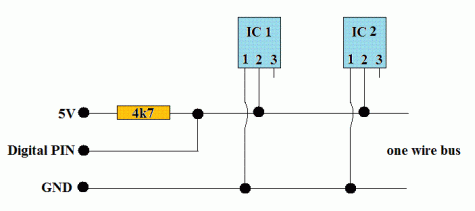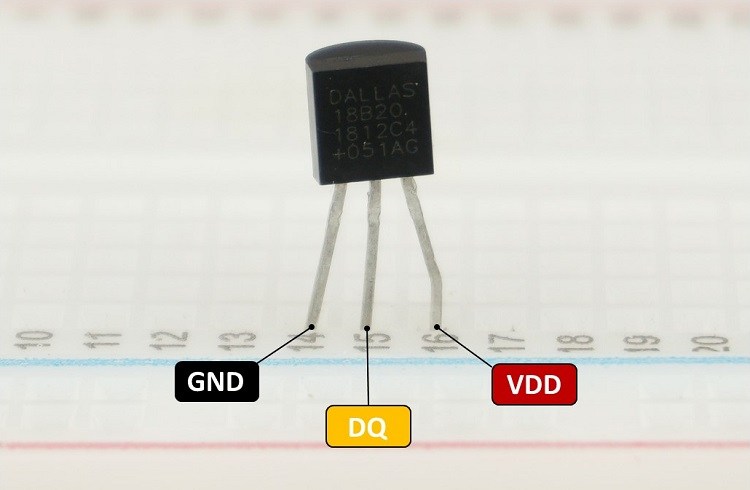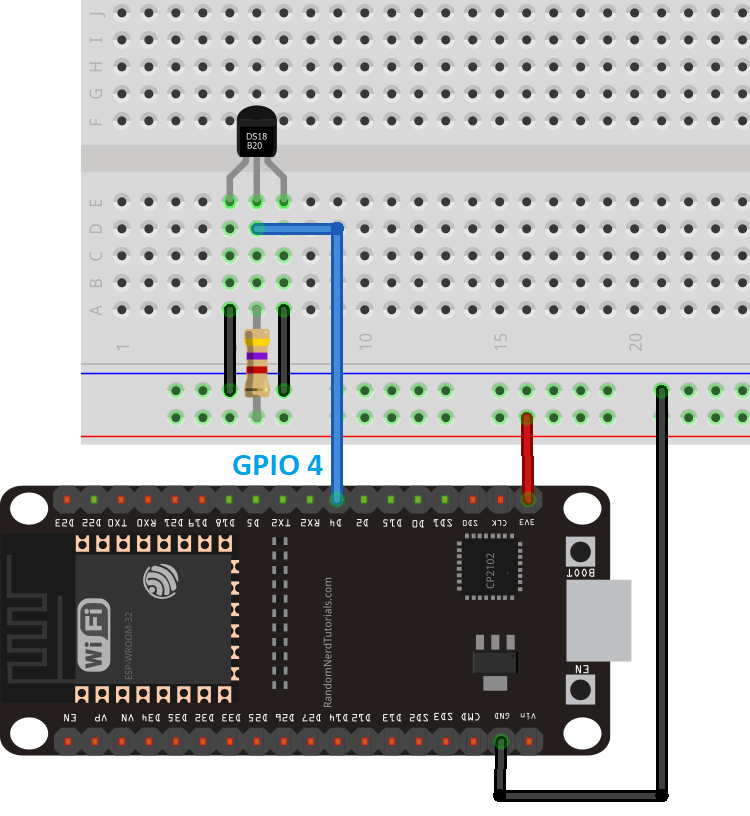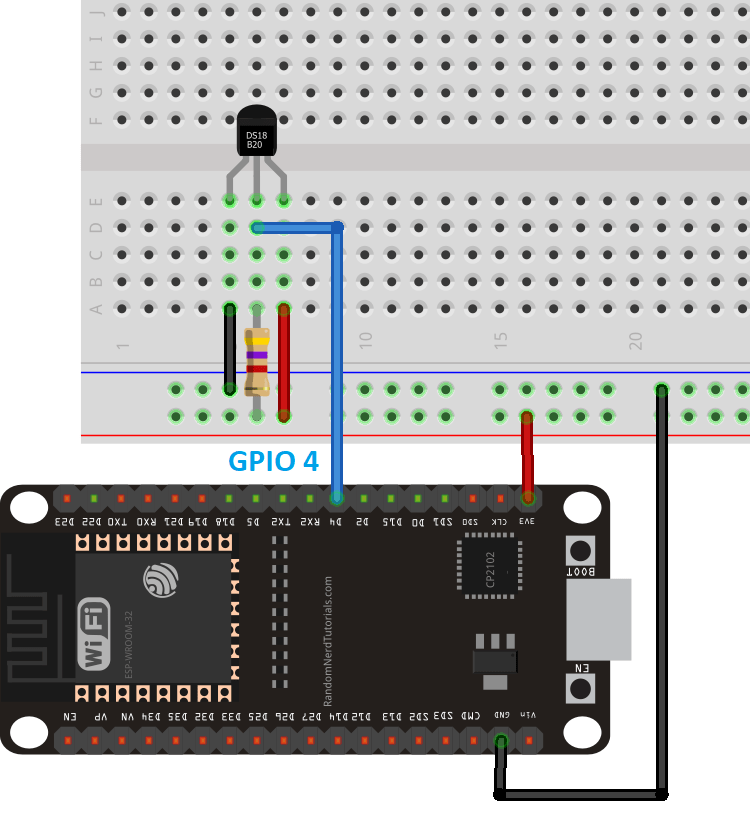Gateway per BUS Dallas (OneWire)
Schema di principio del BUS OneWire
Notare i collegamenti in parallelo tra tutti i dispositivi attorno a 2 (parasite mode) o 3 fili (normal mode).

Il sensore di temperatura DS18B20

Parasite mode
Il bus onewire teoricamente possiede 2 soli fili (uno senza la massa):
- una massa comune per il ritorno della corrente
- un filo dati che è usato anche per l’alimentazione del dispositivo. Poichè il livello L (basso) è di solito codificato con 0V l’alimentazione risulta intermittente. Per ovviare a questi buchi (lack) di alimentazione si collega una capacità in parallelo a massa e linea dati che funge da tampone locale alla mancanza di alimentazione dovuta a sequenze consecutive di zeri. Questo modo di funzionamente si chiama parasite mode.

Normal mode
In pratica è usuale anche un collegamento a 3 fili (2 senza la massa):
- una massa comune per il ritorno della corrente
- un filo dati che è a se stante cioè non viene usato anche per l’alimentazione del dispositivo.
- un positivo di alimentazione che alimenta tutti i dispositivi. Questa modalità si chiama normal mode.

Librerie del progetto
Dal punto di vista SW sevono due librerie da scaricare e scompattare dentro la solita cartella libraries (disponibili su Git al link https://github.com/PaulStoffregen/OneWire e al link https://github.com/milesburton/Arduino-Temperature-Control-Library) :
- OneWire-master.zip da scompattare e rinominare semplicemente OneWire. Per installare il protocollo standard OneWire.
- Arduino-Temperature-Control-Library-master da scompattare e rinominare semplicemente DallasTemperature per installare il particolare protocollo applicativo di quella categoria di sensori di temperatura (DS18B20).
Gateway OneWire-LoRaWan con modem RN2483 per la lettura di un solo sensore
La libreria MQTT è asincrona per cui non bloccante. E’ adoperabile sia per ESP8266 che per ESP32.
Anche in questo caso sono possibili entrambi i collegamenti, normal mode e parasite mode. Di seguito è illustrato il normal mode:
/********************************************************
* This demo is only supported after RUI firmware version 3.0.0.13.X on RAK811
* Master Board Uart Receive buffer size at least 128 bytes.
********************************************************/
#include "RAK811.h"
#include "SoftwareSerial.h"
#include <OneWire.h>
#include <DallasTemperature.h>
#define WORK_MODE LoRaWAN // LoRaWAN or LoRaP2P
#define JOIN_MODE OTAA // OTAA or ABP
#if JOIN_MODE == OTAA
String DevEui = "8680000000000001";
String AppEui = "70B3D57ED00285A7";
String AppKey = "DDDFB1023885FBFF74D3A55202EDF2B1";
#else JOIN_MODE == ABP
String NwkSKey = "69AF20AEA26C01B243945A28C9172B42";
String AppSKey = "841986913ACD00BBC2BE2479D70F3228";
String DevAddr = "260125D7";
#endif
#define TXpin 11 // Set the virtual serial port pins
#define RXpin 10
//#define SensorPin A0 // used for Arduino and ESP8266
#define SensorPin 4 // used for ESP32
#define DebugSerial Serial
#define TX_INTERVAL ((uint32_t) 300)
#define RESET 15
//sensors defines
#define ONWIREPORT 10
SoftwareSerial ATSerial(RXpin,TXpin); // Declare a virtual serial port
char buffer[]= "72616B776972656C657373";
bool InitLoRaWAN(void);
RAK811 RAKLoRa(ATSerial,DebugSerial);
// Setup the one wire connection on pin 10
OneWire oneWire(ONWIREPORT);
DallasTemperature sensors(&oneWire);
DeviceAddress thermometer;
void inline sensorsInit() {
sensors.begin();
}
void setup() {
DebugSerial.begin(115200);
sensorsInit();
while(DebugSerial.available())
{
DebugSerial.read();
}
ATSerial.begin(9600); //set ATSerial baudrate:This baud rate has to be consistent with the baud rate of the WisNode device.
while(ATSerial.available())
{
ATSerial.read();
}
if(!RAKLoRa.rk_setWorkingMode(0)) //set WisNode work_mode to LoRaWAN.
{
DebugSerial.println(F("set work_mode failed, please reset module."));
while(1);
}
RAKLoRa.rk_getVersion(); //get RAK811 firmware version
DebugSerial.println(RAKLoRa.rk_recvData()); //print version number
DebugSerial.println(F("Start init RAK811 parameters..."));
if (!InitLoRaWAN()) //init LoRaWAN
{
DebugSerial.println(F("Init error,please reset module."));
while(1);
}
DebugSerial.println(F("Start to join LoRaWAN..."));
while(!RAKLoRa.rk_joinLoRaNetwork(60)) //Joining LoRaNetwork timeout 60s
{
DebugSerial.println();
DebugSerial.println(F("Rejoin again after 5s..."));
delay(5000);
}
DebugSerial.println(F("Join LoRaWAN success"));
if(!RAKLoRa.rk_isConfirm(0)) //set LoRa data send package type:0->unconfirm, 1->confirm
{
DebugSerial.println(F("LoRa data send package set error,please reset module."));
while(1);
}
}
bool InitLoRaWAN(void)
{
if(RAKLoRa.rk_setJoinMode(JOIN_MODE)) //set join_mode:OTAA
{
if(RAKLoRa.rk_setRegion(5)) //set region EU868
{
if (RAKLoRa.rk_initOTAA(DevEui, AppEui, AppKey))
{
DebugSerial.println(F("RAK811 init OK!"));
return true;
}
}
}
return false;
}
bool readSensorsAndTx() {
// Split both words (16 bits) into 2 bytes of 8
char payload[2];
Serial.print("Requesting data...");
// Get the temp
sensors.getAddress(thermometer, 0);
sensors.setResolution(thermometer, 12);
sensors.requestTemperatures();
uint16_t temperature = sensors.getTempC(thermometer);
// Split both words (16 bits) into 2 bytes of 8
payload[0] = highByte(temperature);
payload[1] = lowByte(temperature);
Serial.print("Temperature: ");
Serial.println(temperature);
Serial.println(F("Packet queued"));
return RAKLoRa.rk_sendData(1, payload);
}
void loop() {
DebugSerial.println(F("Start send data..."));
if (readSensorsAndTx())
{
for (unsigned long start = millis(); millis() - start < 90000L;)
{
String ret = RAKLoRa.rk_recvData();
if(ret != NULL)
{
DebugSerial.println(ret);
}
if((ret.indexOf("OK")>0)||(ret.indexOf("ERROR")>0))
{
DebugSerial.println(F("Go to Sleep."));
RAKLoRa.rk_sleep(1); //Set RAK811 enter sleep mode
delay(TX_INTERVAL * 1000); //delay 10s
RAKLoRa.rk_sleep(0); //Wakeup RAK811 from sleep mode
break;
}
}
}
}
Sitografia:
https://randomnerdtutorials.com/esp32-mqtt-publish-ds18b20-temperature-arduino/ https://randomnerdtutorials.com/micropython-mqtt-publish-ds18b10-esp32-esp8266/ https://randomnerdtutorials.com/esp32-ds18b20-temperature-arduino-ide/ https://randomnerdtutorials.com/esp32-multiple-ds18b20-temperature-sensors/